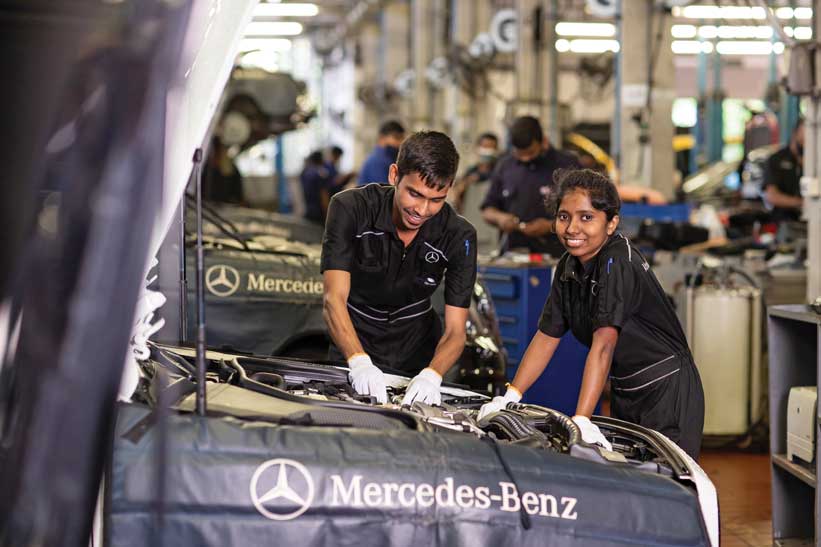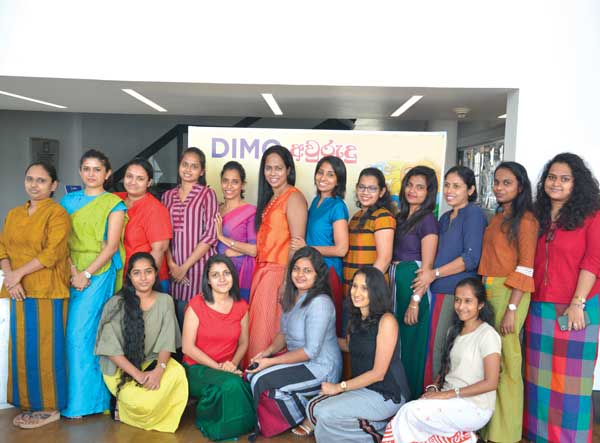DIESEL AND MOTOR ENGINEERING
Q: What would you say is Diesel and Motor Engineering’s (DIMO) purpose when it comes to the Sri Lankan market?

A: DIMO consciously seeks to capitalise on opportunities to transform Sri Lanka as it attempts to meet the changing needs of the contemporary world.
The company has proven its capacity to adapt to change throughout the course of its eight decade long existence; it has managed to shape its identity to fit the market requirements of each period.
Our brand identity is testimony to the organisation’s momentum and progressive principles. It exhibits DIMO’s preparedness and readiness to conquer the future with agility, innovation and excellence.
I believe that our inherent purpose is to collaborate with stakeholders with the intention of transforming their dreams and aspirations into a reality, and create value for the organisation in a responsible way.
We fuel the dreams and aspirations of our communities by partnering with the best brands, technologies, experts and resources, providing world-class service support and turnkey solutions, supplementing the best global brands with our own products and services.
DIMO believes in the five corporate values of integrity, people centricity, excellence, customer delight and accountability. Adhering to these values sets the standards of leadership that shapes the workplace culture.
Q: And what do you consider to be the main components of a ‘great workplace’?
A: An organisation that drives performance through trust, transparency and equity can create an ideal working environment.
A great workplace should ensure that work is exciting, interesting, challenging and meaningful. Career oriented individuals look for these attributes in their professions.
Individuals who are committed, loyal, dedicated and optimistic, and believe in the core philosophy of the business, are more likely to actively participate in organisational activities. A collection of like-minded individuals creates a lively, homely and efficient labour force.
Every employee is entitled to appreciation and seeing their contributions valued. They expect to celebrate victories, earn praise, recognition and gratification. Reasonable compensation, deserving pay increments and other opportunities to earn based on performance entices an employee to perform better.
These factors will keep the top performers satisfied; and the goodwill generated through similar rewarding schemes will contribute to attracting new talent.

An Avurudu celebration at Diesel and Motor Engineering (DIMO).
DIMO Tribe members at the Mercedes-Benz
Q: In your opinion, how important is employee engagement in the context of nurturing a great workplace culture?
A: Whether the workforce remains engaged with the organisation’s vision and mission or not depends on the nature of the workplace culture.
A greater level of employee engagement can be interpreted in a plethora of perspectives. It could point to the presence of superior levels of customer satisfaction due to pleasant and diligent service. Employee retention and lower staff turnover may indicate that staff welfare is given a certain level of priority.
Greater productivity that leads to improved profit margins is testimony that employees are playing their part to the best of their abilities.
When an employee is emotionally connected to the organisation, he or she feels compelled to work with pride and a purpose. They look to channel all pent-up energy towards retaining and satisfying customers, and thereby work towards achieving organisational goals and objectives.
Q: Could you describe the role of senior management in promoting an open and engaging culture? And how does this build trust among the workforce?
A: In my view, the values and behaviour of the senior management are reflected in their management style. The management style sets the precedent for the creation of workplace culture.
 Senior management should look to foster trust, transparency and equity across every level of the organisation. Trust is cultivated by ensuring transparency. They must keep the staff updated on the progress of the organisation, and provide constant updates on notable achievements, imminent threats, unfortunate events, accidental failures and so on regardless of the context.
Senior management should look to foster trust, transparency and equity across every level of the organisation. Trust is cultivated by ensuring transparency. They must keep the staff updated on the progress of the organisation, and provide constant updates on notable achievements, imminent threats, unfortunate events, accidental failures and so on regardless of the context.
Employees will begin to trust senior management when they understand that the decision makers are keen to share information and are flexible in hearing their take on the matters at hand.
Q: What measures does DIMO take to ensure and promote organisational agility?
A: DIMO considers organisational agility to be its utmost priority.
The modern context compels organisations to be progressive. They should be able to predict what to expect in the future.
This is an understanding that DIMO has wielded for many years; and it has enabled the company to create a learning culture that promotes agility to empower the team, which we fondly refer to as our ‘tribe.’
Strategic or vision agility begins with top level management. We are committed to promoting leaders that have agile mindsets. DIMO is confident that the leaders it has recruited are agile and forward thinking, and able to follow organisational purpose and goals with great intent.
We discourage staff members from working in silos, and encourage them to discover new and innovative ways to adapt to the changing market conditions and work environment.
INTERVIEWEE DETAILS
Dilrukshi Kurukulasuriya
Chief Human Resources Officer
COMPANY DETAILS
Telephone:2449797
Email:dimo@dimolanka.com
Website:www.dimolanka.com




